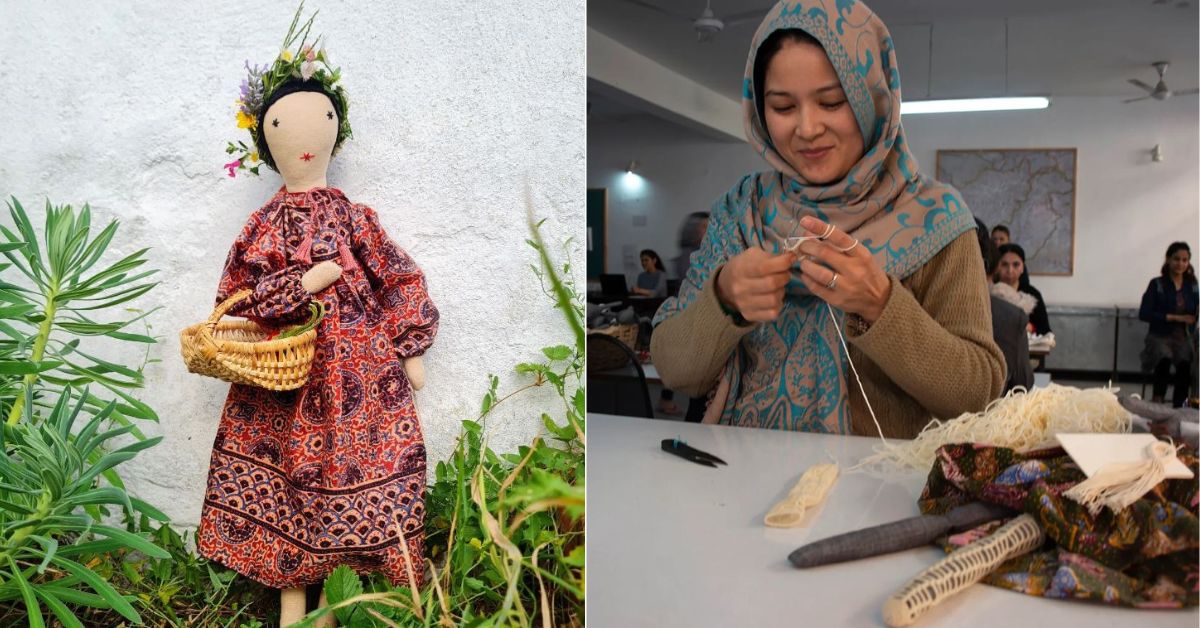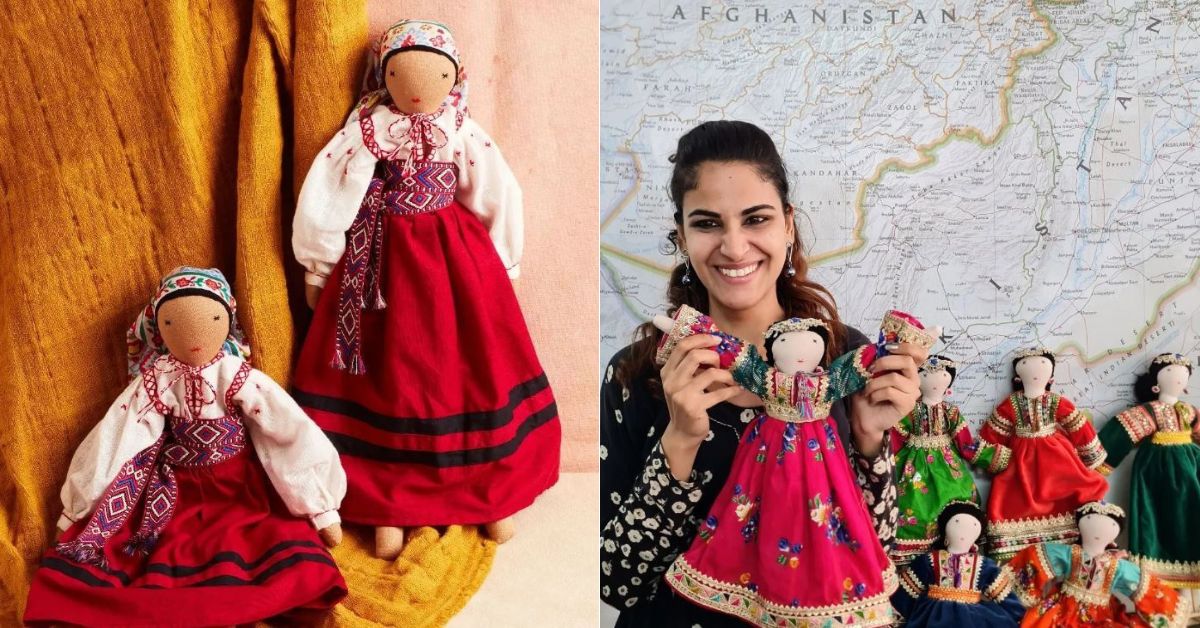Iris Strill and Bishwadeep Moitra based SilaiWali, a social enterprise in India that empowers Afghan refugee girls by serving to them flip waste cloth into handcrafted rag dolls. By means of this, they’ve additionally diverted round 15,000 kg of material from landfills to this point.
In 2017, Iris Strill and Bishwadeep Moitra met a gaggle of Afghan refugee girls in Delhi who had been struggling to outlive on account of lack of employment and earnings. These girls had fled Afghanistan when the Taliban resurgence started in 2010-11.
“In 2011, shortly after the US killed Osama bin Laden, it began withdrawing troops from Afghanistan. After a while, the Taliban began coming again with new leaders. In the meantime, its girls began searching for shelter in India,” says Bishwadeep.
“After we met them in Delhi, their state of affairs was dire. They had been hardly surviving as they had been with none employment and incomes. They had been compelled to promote no matter they’d introduced from their homeland,” he provides.
The couple was motivated to financially empower these Afghan girls. A yr later in 2018, the couple began ‘SilaiWali’, a social enterprise that creates rag dolls, pouches, purses, wall artwork, and hangings from upcycled waste cloth generated in extra from garment manufacturing models.
Beginning with 10 girls, they’re now offering a livelihood to greater than 70 Afghan refugee girls. Whereas doing so, they’ve additionally been in a position to divert greater than 15,000 kg of material from coming into into landfills.

Bringing totally different nationalities collectively
Iris, an artwork and design pupil from France, had come to India within the Nineteen Nineties for her diploma mission as a part of her last yr task of artwork faculty. She began coming to India to work with varied non-profit organisations to coach Indian artisans in making merchandise that could possibly be offered within the worldwide market.
She completely settled in India in 2006 after her marriage to Bishwadeep, a former journalist, whom she met at a yoga centre.
Iris continued to work as a design advisor with worldwide clothes manufacturers. That’s when she was struck by the huge quantities of material waste generated by the style business in India.
“She used to go to many of those factories in Delhi, which is a giant manufacturing hub for a lot of worldwide style manufacturers. She found that cloth waste is discarded in excessive bulk portions. It was right here that she was struck with the thought to make use of the scraps for making a helpful product,” shares Bishwadeep.
“As she was already coaching artisan teams, she got here throughout a marginalised group of Afghan refugee girls. The refugee situation was near her coronary heart. We thought that this could possibly be a good suggestion because it was troublesome for us additionally to faucet into the skills of artisans who stay in far off tribal villages. We determined to marry each the ideas of upcycling cloth waste and producing employment for refugee girls,” he provides.
In a bid to do one thing significant, Bishwadeep give up his job as an govt editor at Outlook information journal and co-founded SilaiWali alongside along with his spouse. “Journalism allowed me a strategy to work for society however I needed to do one thing in a different way and I needed to be of service to society in a direct means. I used to be motivated by my spouse to work on the grassroots degree,” he provides.
Thereafter, the couple determined to start out SilaiWali in 2018 for monetary independence of Afghan girls refugees in India.

Catering to 150 cities worldwide
On the firm, Bishwadeep shares that after the waste cloth is sourced from garment factories, it’s sorted, reduce, and remodeled by these refugee artisans into dolls and different residence decor objects; incorporating conventional embroidery, stitching, and crocheting strategies.
The handcrafted dolls mirror the personalities and tales of the artisans, making every creation an emblem of resilience and creativity. “It’s all handwork and every doll displays the distinctive personalities of the artisan who crafted it,” he provides.
SilaiWali participates in commerce exhibits within the US and Paris, boosting its presence within the international market. With this, the couple has been in a position to faucet right into a rising demand for these dolls in 150 cities worldwide in the UK, Japan, Korea, France, and Australia, and in Delhi, Mumbai, Jaipur, Chennai, and Goa inside India.
The handcrafted objects by SilaiWali vary from Rs 820 to Rs 5400. The model exports items price $200,000 yearly, with peak seasons round September to December to cater to Christmas and Halloween orders.
To date, SilaiWali claims to have educated and reskilled 325 girls refugees. “At one level, we had 150 such girls working with us. However most of them migrated to Canada on account of altering immigration insurance policies,” shares Bishwadeep. Regardless of going through such challenges, SilaiWali continues to make a big impression.
Speaking in regards to the wages of the artisans, Bishwadeep says it’s calculated following the wage ladder mandated by the World Honest Commerce Organisation. “Whereas the incomes range from artisan to artisan, they earn between Rs 12,000 to Rs 14,000 each month. It could actually additionally improve relying on components like gross sales and particular orders,” he provides.
Sharing her expertise of working with these girls, Iris says, “Afghan girls have a nice manner. They’re very pleased with their heritage. They take heed to my directions and should not afraid to disagree with me when vital. They’ve proven superb resilience in rebuilding their lives in India, nevertheless momentary their present residence could also be. Many SilaiWali girls have damaged the glass ceiling by being the sole-earning members of their households.”
“Earlier, these households had been struggling to make ends meet. Their youngsters couldn’t be despatched to highschool. We’re glad that our intervention has considerably eased their state of affairs,” provides Iris, who finds this work extraordinarily fulfilling.
Trying again at his resolution to give up journalism to ascertain a profession within the social enterprise sector, Bishwadeep says, “What we do impacts so many households and offers them with dignity, spending energy, demolishing the patriarchal system, and creating an impression that may be seen on the bottom. This work gave me a possibility to immediately interact with the marginalised sections on the grassroots.”
Edited by Padmashree Pande. All images: SilaiWali social verticals.


